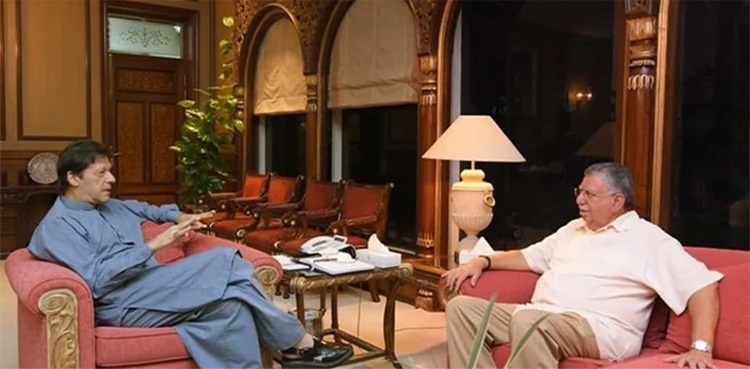
The actions taken by the new financial team of the PTI government are generally appreciated and a reoriented fiscal policy and subsequent maneuvers are now gradually being crystallised.
It is becoming clear that the new team means business and is accordingly shaping and devising policies aimed at increasing tax collection as well as streamlining matters related to direct taxation. It is well-known that the dominance of indirect taxation is proving alarmingly harmful to the vast majority of the people of Pakistan that is fast losing its purchasing power increasing poverty in the country.
Finance minister Shaukat Tarin is a seasoned and steady hand well versed to tackle difficult economic issues and has got the required temperament to handle things with straightforward approach. He has achieved a grip on the national financial apparatus and aims to call the shots according to his perception about economic development. It also appears that the crucial stakeholders of the state are willing to provide him the required space and this is an essential requirement for proceeding ahead.
The result of the renewed and focused approach in this context is the resuscitation of the FBR that has succeeded in exceeding its first two months target and by collecting Rs.850 billion at double than the needed growth rate to hit the annual target that considerably solidifies Pakistan’s request to the IMF for parleying economic matters afresh keeping in view the altered economic situation.
Though the collection targets have been achieved but the caveat is that 55% of the total revenues or Rs.458 billion was collected at the import stage that resulted in high inflation. In addition 70% of the total tax collection comprises of indirect taxes – general sales tax, customs duty and federal excise duty which are the three main sources of indirect taxes. This tendency is worrying and it is required to be eschewed in the longer run though there are myriad difficulties in achieving this target.
The details of the current tax collection is that against the two-month target of Rs.690 billion, the FBR has provisionally collected Rs.850 billion during the July-August period of this fiscal year, exceeding the target by Rs.160 billion. This information was provided by the incumbent chairman FBR who said that there was highly impressive growth rate of 41% during the first two months, as July-August collection of this fiscal year was also Rs.247 billion higher than the same period of the previous year.
The two-month growth rate was nearly double the pace that the FBR needed to achieve the Rs.5.829 trillion annual target. It is worthwhile to mention that the differences over the FBR’s ability to achieve new tax target of over Rs.5.8 trillion was one of the reasons behind deadlock in talks between the IMF and Pakistan as Shaukat Tarin insisted that this target is achievable without taking additional measures provided a reasonable time frame is provided to the tax machinery.

This is quite a reasonable suggestion and may prove to be an appropriate option keeping in view the restrictive economic situation during the pandemic. However, the IMF’s position was that there was a gap of Rs.300 billion and Rs.350 billion between the IMF desired target and that alternate measures are required to achieve it.
Chairman FBR emphasised that the current political situation is conducive for providing extra space to the FBR to apply taxation laws irrespective of whether someone was powerful or not. He said that centralised monitoring and supervision, realignment of tax offices jurisdictions and crackdown against unethical practices and smuggling also helped increasing the collection.
He added that he would not care about the nature of taxation and its source of collection as long as his end objective is achieved. He appeared not pleased with the so-called reform process though he mentioned that he was doing restructuring in the FBR that was yielding desired results.
He went on to describe that withholding of taxes at the import stage is the deliberate choice of the parliament, which has its own advantages therefore this has been pursued. The imports stage collection was also increasing because of high imports of food items, machinery and raw materials that the chairman termed as indicating the pick-up in economy.
Many taxation experts are of the view that the growing reliance on import stage and also indirect taxes has severely distorted the progressive and regressive taxation ratios. The heavy reliance on import taxes and duties may cause inflation in the country, as taxes paid at the import stage are usually recovered by increasing the prices.
These import taxes are also causing an increase in prices of electricity and petroleum products. They also point out that the banker-led team at the helm of economic affairs may not result in smooth sailing between these advisors and the FBR officials. It is quite obvious that Shaukat Tarin will support his banking colleagues such as Aneeq Khawar who would naturally tilt towards private sector and the top officials of the FBR may resent this dominance.
They also observe that both the PM and Shaukat Tarin are only talking of direct taxes notwithstanding that the leakages of customs duties and sales tax are bleeding the Revenue System and it is usually attributed towards the complicity of the private sector.
The FBR is going ahead with its aggressive tax collection drive and is a radical move, the government has proposed to disconnect mobile phones, electricity and gas connections of non-filers of income tax returns and bar businessmen from using banking instruments like cheques in its desperate attempts to broaden a narrow tax base.
The proposal also includes slapping 35% additional income tax on electricity bills of lawyers, dentists, doctors, accountants and also to share all types of data of the existing taxpayers with NADRA and this will take their total income tax to 43% of the billed amount.
The steps are being taken to broaden the narrow tax base comprising only three million income tax return filers after all previous efforts and policy actions have favoid full disclosure of their sales.
In this context the FBR has proposed an amendment to Section 21 of the Income Tax Ordinance that says that no deduction will be allowed in computing the income of a person under the head “Income from Business” by a taxpayer not being a company.
Similarly, any expenditure by a taxpayer being a company for a transaction, paid or payable under a single account head which, in aggregate, exceeds Rs.250,000 made other than by digital means from business bank account of the taxpayer will be treated as income instead of expenditure.
The only exemption from the digital payment will be small payments of up to Rs.25,000 and expenditures on account of utility bills, freight charges, travel fare and payment of taxes.
However, the government has decided to enforce digital mode of payments without first plugging loopholes that led to creation of black money like difference between market value and FBR values of properties, agriculture income tax exemption and tax-free foreign remittances.
The post FBR proceeding ahead appeared first on ARY Blogs.
from ARY Blogs https://ift.tt/3zezibt




